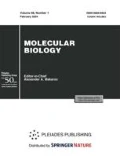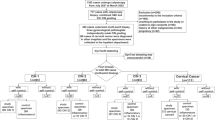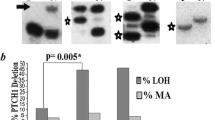Abstract
The methylation status of genes p16, MLH1, HIC1, MGMT, N33, and RB1 was determined in cervical smears of women without gynecological pathology, in biopsies from patients with high-grade cervical intraepithelial neoplasia (CIN3), and in samples of nondysplastic cervical tissue adjacent to CIn3. The level of methylation of these genes in normal smears was insignificant. In CIN3, methylation frequencies were as follows: 58% for p16, 51% for MLH1, 84% for HIC1, and 27% for N33. However, dysplastic tissues did not differ significantly from the control with respect to the methylation frequencies of the MGMT and RB1 genes (8 and 15%, respectively). The methylation frequency of the suppressor genes in nondysplastic, morphologically normal adjacent tissues was also high. We found that 21% of samples (9/42) had microsatellite instability at chromosomes 5q11.2–q14.3 (3/42) and 13q14–q14.3 (6/42). Loss of heterozygosity (LOH) at region 13q14 was detected in 7% of samples (3/42).
Similar content being viewed by others
References
Heilmann V., Kreienberg R. 2002. Molecular biology of cervical cancer and its precursors. Curr. Womens Health Rep. 2, 27–33.
House M., Guo M., Iacobuzio-Donahue C., Herman J. 2003. Molecular progression of promoter methylation in intraductal papillary mucinous neoplasms of the pancreas. Carcinogenesis. 24, 193–198.
Maruyama R., Toyooka S., Toyooka K., et al. 2002. Aberrant promoter methylation profile of prostate cancers and its relationship to clinicopathological features. Clin. Cancer Res. 8, 514–519.
Muller H., Fiegl H., Widschwendter A., Widschwendter M. 2004. Prognostic DNA methylation marker in serum of cancer patients. Ann. N.Y. Acad. Sci. 1022, 44–49.
Zaletaev D., Nemtsova M., Strel’nikov V., et al. 2004. Diagnostics of epigenetic alterations in heredirtary and oncological disorders. Mol. Biol. 38, 213–223.
Sutter C., Gebert J., Bischoff P., et al. 1999 Molecular screening of potential HNPCC patients using multiplex microsatellite PCR system. Mol. Cell. Probes. 13, 157–165.
Chen X., Stroun M., Magnenat J., et al. 1996. Microsatellite alterations in plasma DNA of small-cell lung cancer patients. Nature Med. 2, 1033–1035.
Gurin C., Federichi M., Kang L., Boyd J. 1999. Causes and consequences of MSI in endometrial carcinoma. Cancer Res. 59, 462–466.
Knobloch R., Konrad L., Barth P., et al. 2004. Genetic pathways and new progression markers for prostate cancer suggested by microsatellite allelotyping. Clin. Cancer Res. 10, 1064–1073.
Gorgoulis V., Mariatos G., Manolis E., et al. 2000. Allelic imbalance at the 5q14 locus associated with decreased apoptotic rate in NSCLCs. Possible synergistic effect with p53 gene alterations on apoptosis. Lung Cancer. 28, 211–224.
Girard L., Zochbauer-Muller S., Virmani A., et al. 2000. Genome-wide allelotyping of lung cancer identifies new regions of allelic loss, differences between SCLC and NSCLC, and loci clustering. Cancer Res. 60, 4894–4906.
Wong C., Lee J., Lau T., et al. 2002. Clinicopathological significance of loss of heterozygosity on chromosome 13q in hepatocellular carcinoma. Clin. Cancer Res. 8, 2266–2272.
Zemlyakova V., Zhevlova A., Zborovskaya I., et al., 2003. Methylation profile of several tumor suppressor genes in non-small-cell lung cancer. Mol. Biol. 37, 983–988.
Zemlyakova, V., Zhevlova, A., Strel’nikov, V., et al. 2003. Abnormal methylation of several tumor suppressor genes in sporadic breast cancer. Mol. Biol. 37, 696–703.
Ballestar E., Esteller M. 2002. The impact of chromatin in human cancer linking DNA methylation to gene silencing. Carcinogenesis. 23, 1103–1109.
Malyukova A., Loginov V., Khodyrev D., et al. 2004. Methylation of the putative tumor suppressor gene RASSF1A in primary cervical tumors. Mol. Biol. 38, 1005–1013.
Narayan G., Arias-Pulido H., Koul S., et al. 2003. Frequent promoter methylation of CDH1, DAPK, RARB and HIC1 genes in carcinoma of cervix uteri: Its relationship to clinical outcome. Mol. Cancer. 2, 24.
Virmani A., Muller C., Rathi A., et al. 2001. Aberrant methylation during cervical carcinogenesis. Clin. Cancer Res. 7, 584–589.
Dong S., Kim H., Rha S., Sidransky D. 2001. Promoter hypermethylation of multiple genes in carcinoma of the uterine cervix. Clin. Cancer Res. 7, 1982–1986.
Widschwendter A., Muller H., Fiegl H., et al. 2004. DNA methylation in serum and tumors of cervical cancer patients. Clin. Cancer Res. 10, 565–571.
Reesink-Peters N., Wisman G., Jeronimo C., et al. 2004. Detecting cervical cancer by quantitative promoter hypermethylation assay on cervical scrapings: A feasibility study. Mol. Cancer Res. 2, 289–295.
Waki T., Tamara G., Makoto S., Motoyama T. 2003. Age-related methylation of tumor-supressor and tumorrelated genes: An analysis of autopsy samples. Oncogene. 22, 4128–4133.
Feng Q., Balasubramanian A., Hawes S., et al. 2005. Detection of hypermethylated genes in women with and without cervical neoplasia. J. Natl. Cancer Inst. 97, 273–282.
Herman J., Merlo A., Mao L., et al. 1995 Inactivation of the CDKN2/p16/MTS1 gene is frequently associated with abberant DNA methylation in all common human cancers. Cancer Res. 55, 4525–4530.
Kondo Y., Shen L., Issa J. 2003. Critical role of histone methylation in tumor suppressor gene silencing in colorectal cancer. Mol. Cell Biol. 23, 206–215.
Uehara E., Takeuchi S., Tasaka T., et al. 2003. Aberrant methylation in CpG islands of multiple genes in therapyrelated leukemia. Int. J. Oncol. 23, 693–696.
Leung J., Yuen S., Chung L., et al. 1999. hMLH1 promoter methylation and lack of hMLH1 expression in sporadic gastric carcinomas with high-frequency microsatellite instability. Cancer Res. 59, 159–164.
Baylin S., Herman J., Graff J., et al. 1998. Alterations in DNA methylation: A fundamental aspect of neoplasia. Adv. Cancer Res. 72, 141–196.
Lee S., Lee H., Kim J., et al. 2003. Aberrant CpG island hypermethylation along multistep hepatocarcinogenesis. Am. J. Pathol. 163, 1371–1378.
Zochbauer-Muller S., Fong K., Virmani A., et al. 2001. Aberrant promoter methylation of multiple genes in non-small-cell lung cancers. Cancer Res. 61, 249–255.
Bhowmick N., Neilson E., Moses H. 2004. Stromal fibroblasts in cancer initiation and progression. Nature. 432, 332–337.
Heselmeyer K., Schrock E., Manoir S., et al. 1996. Gain of chromosome 3q defines the transition from severe dysplasia to invasive carcinoma of the uterine cervix. Proc. Natl. Acad. Sci. USA 93, 479–484.
Chung T., Cheung T., Lo W., et al. 2000. Loss of heterozygosity at the short arm of chromosome 3 in micro-dissected cervical intraepitelial neoplasia. Cancer Lett. 154, 189–194.
Author information
Authors and Affiliations
Additional information
Original Russian Text © T.V. Kekeeva, A.I. Zhevlova, Yu.I. Podistov, Yu.V. Solov’eva, D.V. Zaletaev, M.V. Nemtsova, 2006, published in Molekulyarnaya Biologiya, 2006, Vol. 40, No. 2, pp. 224–230.
Rights and permissions
About this article
Cite this article
Kekeeva, T.V., Zhevlova, A.I., Podistov, Y.I. et al. Aberrant methylation of tumor suppressor genes and allelic imbalance in cervical intraepithelial neoplasia. Mol Biol 40, 194–199 (2006). https://doi.org/10.1134/S0026893306020038
Received:
Issue Date:
DOI: https://doi.org/10.1134/S0026893306020038




